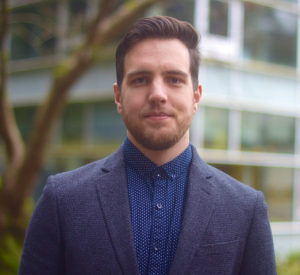During our Spotlight on MPPGA Alumni Careers series, meet the Master of Public Policy and Global Affairs alumni who are committed to addressing the pressing and complex public policy challenges facing the world.
This week, we are featuring Nathan Seef (’18) who is a Policy Analyst within the Trade and Investment team for the Low-Carbon Energy Sector at Natural Resources Canada in Ottawa, Canada.


I entered the MPPGA program with an interest in defense, security, and international law. However, as I explored the courses available to me I was, to the annoyance of most around me, very interested in economics, statistics, and political economy. The courses that really grabbed my attention were those that explored how policy and economics influence specific decisions by industry and people. Investigating the unintended consequences/impacts of policies, and the process that went into designing those policies, I found to be the most rewarding element of the MPPGA.
Which opportunities did you participate in during the MPPGA program that contributed to your career journey?
During the MPPGA I took the opportunities to participate in both the Co-op program and the Global Policy Project. As part of my Co-op, I worked with Global Affairs Canada evaluating and reporting on the results of Canada’s development assistance. This was around the time the Government was finalizing the Feminist International Assistance Policy, and seeing some of the behind-the-scenes work that went into drafting and fine-tuning a high-level policy document was the most rewarding experience to come from my Co-op.
As part of the Global Policy Project, my team worked with a microfinance company in Timor-Leste that was looking into the possibility of entering the mobile banking space within the country. Working with a client that had specific objectives and needs, and balancing that against crafting research and stakeholder consultation that may not deliver the answers your client was hoping for was a key lesson I took away from the project and program overall.
What job titles have you held since graduation?
Since graduating, I have been employed by Natural Resources Canada as a policy analyst in a career development program. This has allowed me to rotate throughout the department working in communications and international energy teams.
What is your current position and main responsibilities?
I currently work as a Policy Analyst within the Trade and Investment team for the Low-Carbon Energy Sector at Natural Resources Canada. I am primarily responsible for supporting Canada’s efforts to attract and increase trade and investment in the clean energy sector i.e., smart grid technology, energy efficiency, renewables, etc. We work with multiple departments to ensure Canada’s energy sector remains competitive on a global stage.
What makes you proud about your current job? How does it relate to your MPPGA degree?
I am most proud of the work our entire team does to represent Canada’s low-carbon energy sector on the international stage. The MPPGA gave me the tools to understand macroeconomic trends in the energy sector globally, design and implement stakeholder consultations, and brief senior management.
How do you influence change or hope to influence change in your professional and/or personal life?
As part of my job I have the opportunity to learn about leading edge, Canadian energy technologies. Part of the challenge of my position is to translate those technical elements of the energy sector into clear messaging for an investment audience. I hope to influence change by supporting Canadian energy leaders to compete for the investment they need to deploy their technologies for the benefit of Canadians.
What career advice would you give to MPPGA students and alumni?
I would highly recommend MPPGA students speak to people working in the policy arena that most interests you. There are so many different actors in all areas of policy and people working in that space will know where the most influential/active work is happening in that space – it’s not always the obvious answer. Further, if you can, take advantage of the Co-op program and global policy project to work with companies/departments in a policy space outside of your specific interest. If you’re entering the policy world, having experience related to your area of interest is helpful, but policy skills are highly transferable and your time in the MPPGA is a great chance to experiment.
Thank you Nathan!


